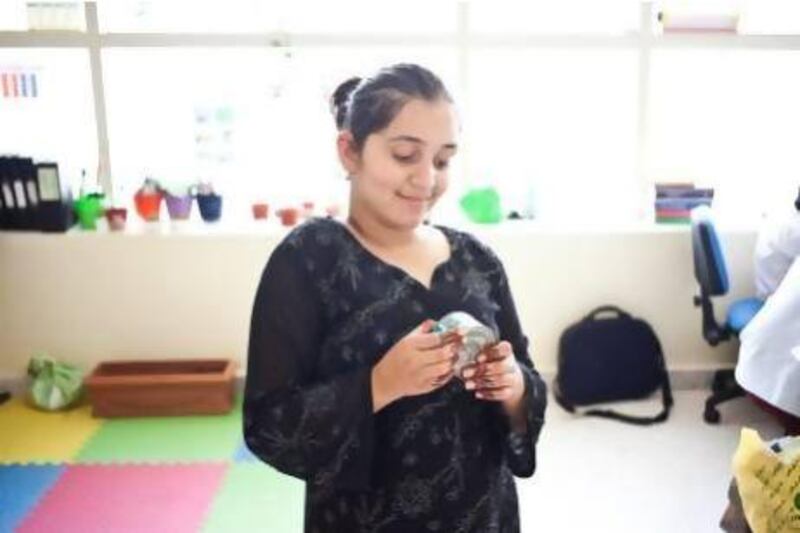DUBAI // For Sara Alam, there is no such thing as a simple trip to the grocery.
Sara, 16, follows a fixed 12-step procedure, starting with making a list of no more than four items and ending on a review with her teacher of what she has bought.
Any diversion from this and she will forget how it is done.
Sara, a pupil with developmental delay at Mirdif Private School, is one of three with special needs in a programme teaching them to live and work independently.
The programme was developed by Stepping Stones for those aged 12 to 17 who cannot cope with more rigorous academic courses.
Three started in September with more expected next month.
“We had to start with a small group because it’s the first of its kind within a school setting,” said Adam Griffin, the vocational class teacher.
The children must be capable of communicating their wishes, making the course unsuitable for more severely autistic children.
Sara's mother believes it will help.
“I was never looking for academics and that is all you find at schools here,” said Irem Alam, a Canadian-born Pakistani.
“She is hearing-impaired, takes time to process directions and has problems with long-term memory. Directions have to be short and simple. I get her to repeat it so I know she has heard me.”
On Tuesdays, pupils learn maths and money management at the mall behind the school.
Sara rushed to get a basket when she entered the supermarket but then stopped to help classmates.
“Tanay, read the signs and find what you want,” she told a classmate, who struggled to pay attention. “I am trying to be helpful because he gets distracted and likes to grab stuff,” she told her teacher.
While helping them to look for items, Mr Griffin explained how to read prices, add and compare costs.
When Sara reached the till, she pulled out a Dh20 and two Dh5 notes and considered what to give for several minutes. “It is Dh9, so should I given Dh20?” she asked.
With a little help from her teacher, she handed over the Dh5 notes.
The teacher praised her for completing the task. “I saved some money,” she said excitedly.
Mr Griffin said: “We do not want to teach them trigonometry or permutations. They do not need that.”
"What they need to learn is concepts of fractions, percentages, decimals, and their use in activities like these."
Depending on their level, they are integrated into regular English, science and health lessons at school.
There are also lessons in anger management, speech and occupational therapy. Pupils explore careers in areas including IT, photography, cooking and handicrafts.
Mrs Alam has been told Sara would make a good teaching assistant.
“She does not see differences in people like we do,” she said. “She is always ready to help and they are using that to direct her towards a career. Sara has been assisting the teachers in the primary school and that has boosted her confidence.”
Mrs Alam’s only worry is that such programmes are not recognised as formal education in the UAE because of the lack of a secondary school equivalency certificate.
“I will have to move if nothing happens in the next two years,” she said. “I want to see her be independent, to be able to take public transport, go to the supermarket by herself.
“In school, they think she could drive. The teachers see more in her than I do,” she laughed.






